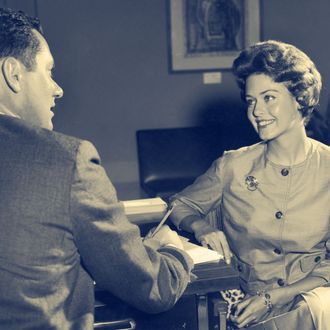
The only thing worse than a first date is a job interview. You’ve got 30, 60, or 90 minutes impress upon your would-be employer that you’re just the right human for the job — a fit not only for the role, but the team, your potential boss, and the organization overall. But the thing about humans is that we’re wired to be lazy. As the Nobel Prize–winning psychologist Daniel Kahneman observed, a “law of least effort” governs not just physical tasks, but mental ones. If people are doing something while rushed, hungry, stressed, or overly routine, they’re going to — quite unconsciously — not think too hard about it.
In hiring, this routine is actually prized. Everybody — even Google — sucks at predicting how well someone is going to perform in their work just from the interview process, so in the interest of collecting consistent data, firms need their interviewers to follow really consistent interview scripts. They’ll ask you about what you’re looking for in a job, what your work experience is like, or to walk them through your résumé. But, as organizational psychologists Tanya Menon and Leigh Thompson put it in a new post at the Harvard Business Review, super-routine tasks put the law of least effort into action, like how you can make your commute home from work without even thinking about it.
As the interviewee, you don’t want to be the ignored drive home. This doesn’t mean that you should come to the interview dressed like Elvis; it does mean that you should break out of the interview routine. Other management research has shown that absent of explicit hiring standards, hiring managers use themselves as the proxy of worthiness for a position — which is part of why companies hire the same type of person over and over again. So in that way, a job interview is a lot like a first date: You’re establishing a connection, finding common ground, and in doing so, validating the person across the table and making yourself memorable to them.
Menon, who’s at Ohio State University’s Fisher College of Business, and Thompson, who’s at the Kellogg School of Management at Northwestern University, say that they often see MBAs who are “too smooth” with their replies, firing into a canned, rehearsed response as soon as the interviewer has finished their question. It’s better, they say, to take a moment, then pluck a few key words from your interviewer’s question and have your answer depart from there. This way, it shows that you’re listening. To paraphrase positive psychologist Barbara Fredrickson, you’re getting out of your cocoon and attuning to the other. (This is also a reporting technique. If I’m interviewing someone for a story, I want to show them that I’m closely attending to what they’re saying, which will lead to them opening up more and a richer, more revealing conversation.) Listening builds trust, and people tend to like people they can trust.
That’s why you’ve got to key into commonalities, even if they seem minor. “If you can find even one point of commonality in a few moments of interacting, you can shift from outsider to insider in the interviewer’s mind,” Menon and Thompson write. Social identity theory says that people are constantly placing people into in-groups and out-groups, so anything you can do to become a member of the in-group is useful. Maybe you’re from the same town, root for the same team, have taken trips to similar parts of the world. While that might seem like trivial small talk, it primes nontrivial rapport. The point, the organizational psychologists say, is to no longer be another box to check on the interviewer’s to-do list. To be memorable, you need to show the person you’re talking to that you’re just like them.

